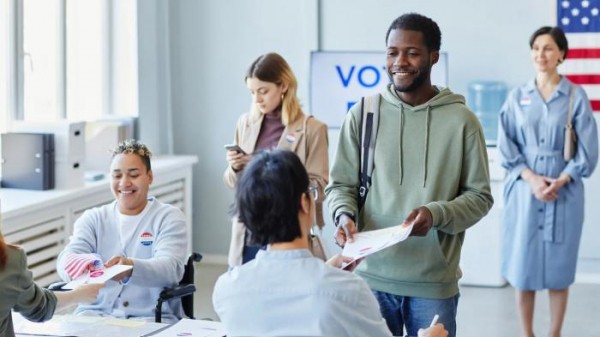Poised for Political Engagement: 64% of Maryland 18-Year-Olds Are Registered to Vote
Report by UMD, The Civics Center Shows Progress Following Reforms
Nearly two-thirds of 18-year-old Marylanders are registered to vote, thanks in great part to policies and education efforts to engage them, finds a report published Tuesday by the University of Maryland and a nonprofit partner, The Civics Center.
The 64% of Maryland registered 18-year-olds is significantly higher than New York’s and double the rate in Pennsylvania, which both more recently instituted reforms to serve new voters, according to the analysis of data from the Maryland Voter File and the U.S. Census Bureau’s American Community Survey. (Comparatively, 86% of all eligible Marylanders are registered voters, according to the state Department of Legislative Services.)
The report by UMD’s Maryland Democracy Initiative (MDI) and Center for Democracy and Civic Engagement (CDCE) and the Los Angeles-based organization that supports voter education in high schools also found that younger teens are also eager to vote, with 52,510 16- and 17-year-olds pre-registered and thus automatically able to do so once they turn 18.
“It’s amazing that so many young people are excited about this election and registering to vote,” said CDCE Chief Strategist Sam Novey.
More than 78,000 Marylanders turn 18 every year, and the state over the past 15 years has instituted a long list of policies to engage them. In 2010, Maryland became only the fifth state in the nation to allow teens to pre-register at 16. A year later, it began electronically registering people to vote when they got driver’s licenses at Motor Vehicle Administration offices, and launched online voter registration in 2012. Beyond that, even the state’s high school curriculum on American government includes voter registration as a topic.
The researchers say that there’s still plenty of room for improvement, particularly in certain parts of the state. The pre-registration rate for 16- and 17-year-olds is over 40% in Worcester, Queen Anne’s, Frederick, Anne Arundel, Talbot and Harford counties, but under 25% in the city of Baltimore and Dorchester and Prince George’s counties.
In addition, while Baltimore’s 18-year-old registration rate from the end of 2023 is nearly double that of New York City as of August 2024, less than half (47%) of 18-year-olds in Baltimore are registered to vote compared to the more than 70% in Worcester, Frederick, Talbot, Harford, Anne Arundel and Montgomery counties.
“I think the key next step is to investigate variations in the rate at which young people get a driver's license across counties. That is one of the most likely suspects behind the variation we see across counties,” said Michael Hanmer, MDI co-PI, CDCE director and government and politics professor.
The researchers also found that factors like race, median household income, education, and the share of the population that speaks a language other than English at home had an impact on pre-registration and registration rates. They found that a 10 percentage-point increase in the share of the population that is white is associated with a nearly 3 percentage-point increase in the pre-registration rate.
“More research is needed to understand exactly what policies are needed in order to equitably serve all new voters in Maryland and close the gaps we see in this report,” Novey said. “Data from other states shows that upgrading automatic voter registration at the MVA and increasing voter education efforts in schools are key sustainable policies that can improve youth voter registration and participation rates.”
These findings are consistent with previous findings by The Civics Center, a Los Angeles-based organization that supports voter education in high schools.
“High schools in Maryland and across the U.S. can provide the education and infrastructure needed to ensure that the opportunity to preregister becomes a reality, and that 100% of students have the support they need to register and make their voices heard at the ballot box—this election and for the rest of their lives,” said Laura W. Brill, founder and CEO of The Civics Center.
MDI is a nonpartisan, interdisciplinary effort to encourage civic participation and tackle threats to democracy by combining expertise from the College of Behavioral and Social Sciences, College of Education, Philip Merrill College of Journalism and School of Public Policy.
“One of the most interesting parts of this project has been the opportunity to learn from our partners at The Civics Center and the interdisciplinary group in MDI,” said Hanmer, MDI co-principal investigator. “The diverse perspectives that the team brings to this issue will be essential for co-creating proposed solutions that serve Maryland's high school students.”
This article by Rachael Grahame originally appeared in Maryland Today.
Published on Wed, 09/18/2024 - 17:34


